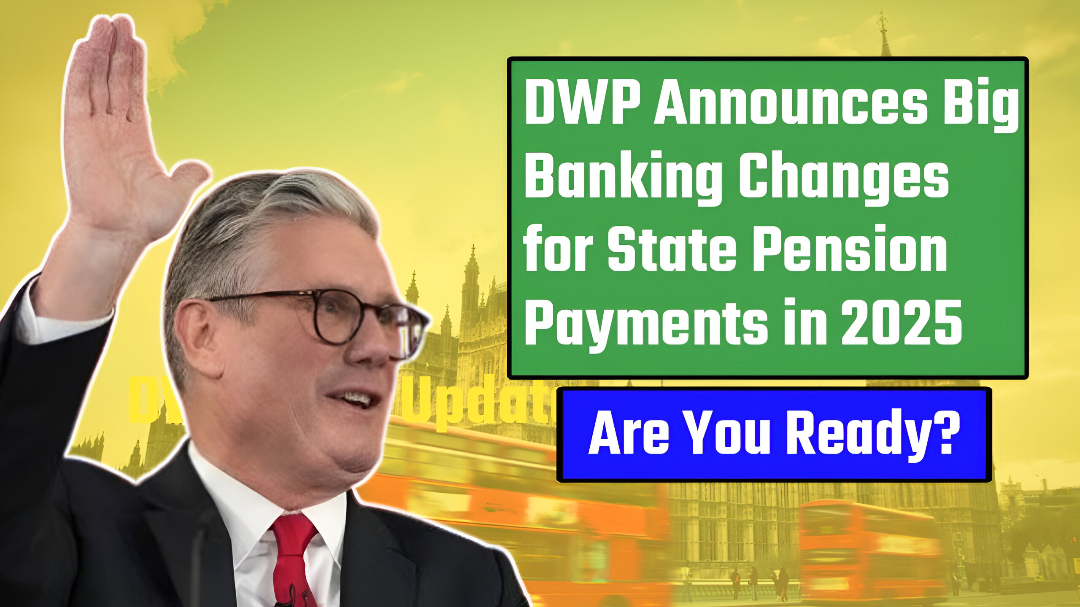The Department for Work and Pensions (DWP) has confirmed that from 2025, several new banking and payment rules will come into force, affecting millions of UK state pensioners. These changes will influence how, when, and in some cases where your pension payments are made.
For most people, the transition should be smooth – but for others, failing to prepare could mean delays or even missed payments. This guide explains the full details of the new rules, why they’re being introduced, and the steps you can take now to make sure your pension income continues without disruption.

Why Are State Pension Bank Rules Changing in 2025?
The Government says the updates are designed to:
- Strengthen payment security and reduce fraud.
- Modernise systems to work with faster payment technologies.
- Ensure payments reach the right account holders even if banking details change.
- Comply with new UK financial regulations being rolled out nationwide.
The DWP has worked with banks, building societies, and the Post Office to create a system that is more secure but also more digital-first – something that could be a challenge for pensioners who still prefer in-branch banking.
Who Will Be Affected by the 2025 Banking Changes?
While the new rules cover all UK state pension payments, the impact will be felt most by:
- Pensioners who still receive payments into a Post Office Card Account.
- People using joint bank accounts for their pension.
- Anyone living abroad who gets their state pension into an overseas account.
- Pensioners whose bank account is due to close or change in 2025.
The Six Big Banking Changes Coming in 2025
The DWP has outlined six specific changes that will take effect from April 2025. Here’s what they mean for you:
1. End of Post Office Card Accounts for Pension Payments
If you still receive your pension via a Post Office Card Account, you’ll need to switch to a standard bank or building society account. These card accounts will no longer be supported for state pension payments.
2. Mandatory Account Verification
Before any change to your payment details is processed, the DWP will run an enhanced identity and account check. This is to stop fraudsters redirecting your pension to another account without permission.
3. Faster Payment System Rollout
State pension payments will be moved to the UK’s faster payments network, meaning in most cases, the money should appear in your account within seconds instead of taking several hours.
4. Overseas Payment Reforms
If you receive your pension abroad, there will be stricter checks on foreign bank accounts, and payments will be converted using a revised currency exchange process designed to reduce fees.
5. Joint Account Policy Updates
Where pensions are paid into joint accounts, new consent rules will ensure that both account holders agree to receive the payment this way.
6. Payment Date Flexibility in Certain Cases
If your payment date falls on a UK bank holiday, the new system will allow for more flexible rescheduling, meaning you’re less likely to have to wait longer for your money.
How to Prepare for the New Rules
The DWP says most pensioners won’t need to take action – but based on past experience, it’s best not to leave anything to chance. Here’s how to make sure you’re ready:
- Check your payment account now – Make sure it’s active, in your name, and not due to be closed.
- Update your contact details with both your bank and the DWP.
- If you use a Post Office Card Account, open a standard bank account as soon as possible and inform the DWP of the new details.
- For joint accounts, talk to the other account holder about the new consent rules.
What If You Don’t Make the Changes?
Failing to update your account information or provide the necessary verification could result in:
- Delayed payments – Your pension may be paused until your account details are confirmed.
- Returned funds – Payments sent to closed or incorrect accounts will bounce back, causing further delays.
- Loss of access to certain payment methods – Particularly if you rely on the Post Office Card Account.
Special Considerations for Pensioners Living Abroad
For expats, the 2025 rules will mean:
- You’ll need to provide proof of account ownership from your overseas bank.
- Payments will be made in local currency at exchange rates provided by the UK’s official payment partner.
- The DWP may ask you to reconfirm your details annually to prevent fraud.
The Push Toward Digital Banking – And What It Means for Older People
While the new system offers faster payments and better fraud protection, it also assumes pensioners have regular internet access and are comfortable using online banking.
If you’re not confident with digital banking:
- Ask your bank about telephone banking options.
- Nominate a trusted family member for account help (using proper legal arrangements like a Power of Attorney if needed).
- Attend free digital skills sessions offered by local councils, libraries, or Age UK.
How to Contact the DWP About the 2025 Changes
You can reach the Pension Service:
- By phone: 0800 731 0469 (Monday to Friday)
- By post: The Pension Service, Mail Handling Site A, Wolverhampton WV98 1AF
- Online: Via the official gov.uk pension pages
Always have your National Insurance number ready when contacting them.
Final Word – Don’t Leave It Too Late
The 2025 banking changes aren’t about cutting pensions – they’re about making the system safer and more efficient. But for pensioners who don’t prepare, the result could still be stressful payment delays.
By checking your account, updating your details, and making any necessary changes now, you’ll avoid disruption and keep your retirement income flowing smoothly.